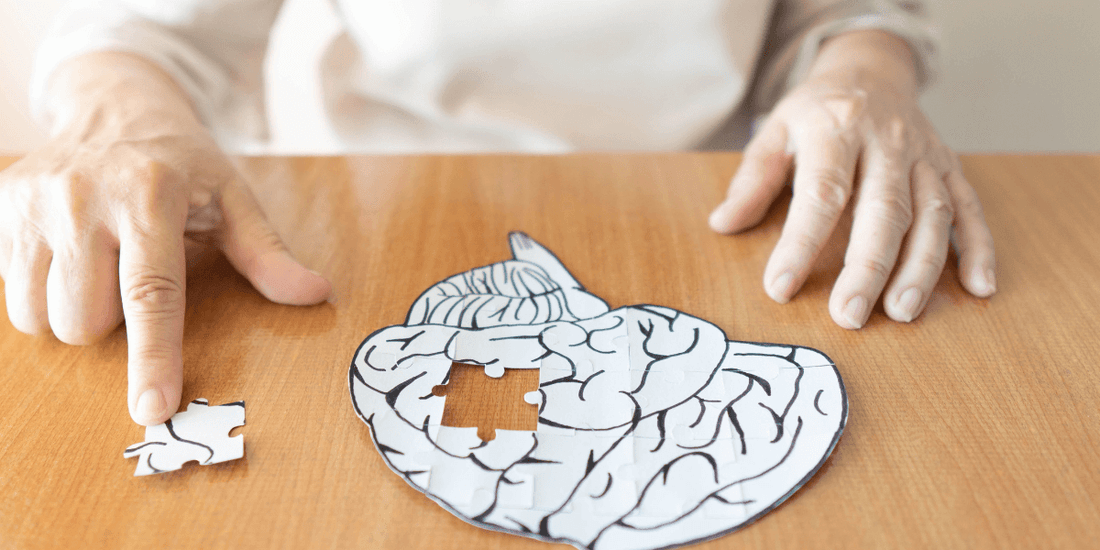The terms ‘dementia’ and ‘Alzheimer’s disease’ are often used interchangeably but have different meanings. Dementia is a general term for a collection of symptoms relating to cognitive decline. It does not describe a specific medical condition, as there are many different types of dementia. One of these is Alzheimer’s disease.
Alzheimer’s is a specific brain disease and the most common form of dementia. Around two-thirds of the 50 million dementia patients worldwide have Alzheimer’s disease. Alzheimer’s disease develops when abnormal structures called amyloid plaques and tau tangles start to build up in the brain.
What is Dementia?
Dementia is an umbrella term for a set of diseases that impair memory, language, thinking, problem-solving, and other cognitive abilities. Some people with dementia also experience emotional, behavioral, and personality changes.
Dementia primarily affects older people and is most frequently diagnosed in those aged 65 or above. However, dementia can affect anyone at any age. Young-onset dementia is a more uncommon form of the condition seen in people under the age of 65.
Dementia is progressive, meaning the symptoms start mild and get worse over time. Eventually, people with dementia will require help performing day-to-day activities and may lose their ability to communicate.
Causes of Dementia
All types of dementia are caused by damage to the brain, though different dementia subtypes are caused by different types of brain damage. Brain damage can cause dementia by affecting the way your neurons (brain cells) function and interact with one another. Eventually, different regions of the brain lose their ability to communicate with one another, leading to the onset of dementia symptoms.
Vascular dementia results from damage to the blood vessels in the brain. This can block blood flow, restricting the brain’s access to oxygen and nutrients. This ‘starves’ the brain and leads to the death of brain tissue.
The greatest risk factor for dementia is age, as cognitive decline is most common among those aged 65 and older. Other risk factors for dementia include:
- High blood pressure
- High blood sugar levels
- Being overweight
- Eating a diet high in sugar and saturated fats
- Low levels of physical activity
- Low levels of cognitive stimulation
- Poor-quality sleep
- Head injuries
- Alcohol use
- Tobacco use
Types of Dementia
There are many dementia subtypes but the most common progressive forms are Alzheimer’s disease, vascular dementia, dementia with Lewy Bodies, frontotemporal dementia, mixed dementia, and young-onset dementia. Alzheimer’s is by far the most common subtype and accounts for up to 80% of all dementia cases.
Other medical conditions linked to dementia include Huntington’s disease, traumatic brain injury (TBI), Creutzfeldt-Jakob disease, and Parkinson’s disease.

What is Alzheimer’s Disease?
Alzheimer’s disease is the most common form of dementia. Like other types of dementia, Alzheimer’s disease impairs memory, thinking skills, and the ability to perform day-to-day tasks. Symptoms are mild in the early stages and become more severe as the illness progresses. Some people with Alzheimer’s lose their ability to communicate with the environment around them, and many will require help performing day-to-day tasks. There is no cure for Alzheimer’s disease.
The Effects of Alzheimer’s Disease on the Brain
Alzheimer’s disease is characterized by an abnormal build-up of proteins in the brain. These proteins form structures called amyloid plaques and tau tangles, which collect inside and between neurons. Amyloid plaques and tau tangles disrupt brain cell function, eventually leading to the development of dementia symptoms.
Changes to the brain caused by Alzheimer’s disease are thought to begin 10-20 years before symptoms become apparent.
What are the Symptoms of Alzheimer’s Disease vs. Dementia?
Alzheimer’s disease is a type of dementia; a collection of diseases that cause progressive cognitive decline. Alzheimer’s and other types of dementia cause many of the same symptoms, including:
- Memory loss
- Impaired thinking skills
- Communication issues
- Difficulty problem-solving and decision-making
- Loss of visual and spatial abilities
- Changes in mood and behaviour
Specific dementia symptoms vary depending on the subtype and the region of the brain affected. Alzheimer’s disease generally affects most parts of the brain, and early signs are usually related to memory loss. This frequently manifests as wandering behaviours and repeating questions.
As the damage progresses, parts of the brain responsible for language, reasoning, and social behaviour are also affected. This can trigger impulsive, out-of-character behaviours and, eventually, the complete loss of communication skills.
Treatment Approaches for Alzheimer’s Disease vs. Dementia
There is no specific difference in the treatment strategies for Alzheimer’s and other types of dementia. Certain medications may help to ease dementia symptoms by temporarily improving memory and thinking-skills, but they are only effective for certain subtypes of dementia. People with Alzheimer’s disease, dementia with Lewy Bodies, Parkinson’s disease dementia, and mixed dementia may benefit from these treatments.
Some dementia patients may benefit from non-medical treatments, including brain-stimulating activities such as reading, socializing, and physical exercise. Games like chess and bridge can also help to maintain cognitive function.
Patients who experience frustration or distress from challenging tasks may prefer music or art therapy. This can help to preserve cognitive function and improve overall quality of life. Looking at photographs or revisiting childhood memories can also improve the psychological wellbeing of dementia patients.

Which Progresses More Quickly: Alzheimer’s Disease or Dementia?
Dementia symptoms start mild and become more severe as the illness progresses. The rate of progression varies depending on several factors, such as the type of dementia. Alzheimer’s disease is thought to progress more slowly than other types of dementia.
Can You Have Dementia Without Alzheimer’s Disease?
Most people with dementia have Alzheimer’s disease, as it is the most common type of dementia. However, there are many other subtypes of dementia. Some of the most common include vascular dementia, dementia with Lewy Bodies, frontotemporal dementia, and young-onset dementia. It is possible to have any of these forms of dementia without Alzheimer’s disease.
Mixed dementia is another common type of dementia. People with mixed dementia show symptoms of both Alzheimer’s disease and vascular dementia.
Conclusion
Dementia is a term for a group of illnesses characterized by progressive cognitive decline. People with dementia experience problems with communication, problem-solving, reasoning, visual and spatial abilities, and performing complex tasks. They may also go through emotional, behavioural, and personality changes. Dementia primarily affects people over the age of 65, though young-onset dementia can develop before this.
Alzheimer’s disease is the most common type of dementia, accounting for up to 80% of all cases. Alzheimer’s is caused by the build-up of abnormal structures (called amyloid plaques and tau tangles) in the brain. These plaques and tangles disrupt the function of brain cells and eventually lead to dementia symptoms.
References
- https://www.ncbi.nlm.nih.gov/books/NBK566126/#
- https://www.ncbi.nlm.nih.gov/pmc/articles/PMC2947856/
- https://www.alzheimers.gov/life-with-dementia/can-i-prevent-dementia
- https://www.alzheimers.org.uk/about-dementia/types-dementia
- https://www.ncbi.nlm.nih.gov/pmc/articles/PMC6073093/
- https://www.nia.nih.gov/health/alzheimers-disease-fact-sheet
- https://www.nia.nih.gov/health/what-happens-brain-alzheimers-disease
- https://www.ncbi.nlm.nih.gov/pmc/articles/PMC3828456/#
- https://www.nia.nih.gov/health/what-happens-brain-alzheimers-disease#
- https://www.nia.nih.gov/health/infographics/understanding-different-types-dementia
- https://alzheimers.org.uk/about-dementia/treatments
- https://www.ncbi.nlm.nih.gov/pmc/articles/PMC7462122/
- https://www.alzheimers.org.uk/about-dementia/symptoms-and-diagnosis/how-dementia-progresses/progression-stages-dementia
- https://www.ncbi.nlm.nih.gov/pmc/articles/PMC5769994/

